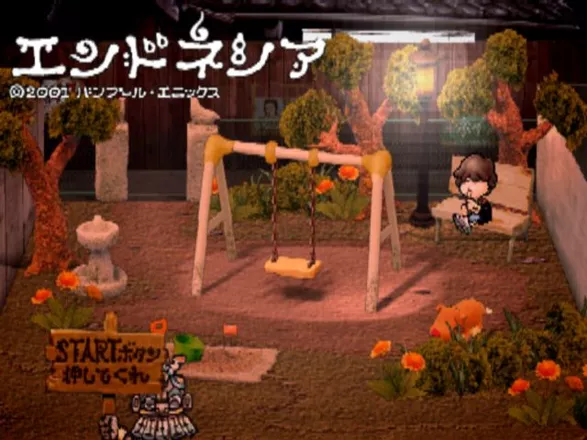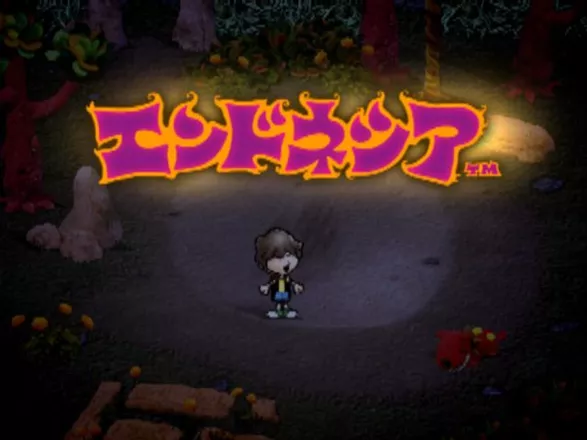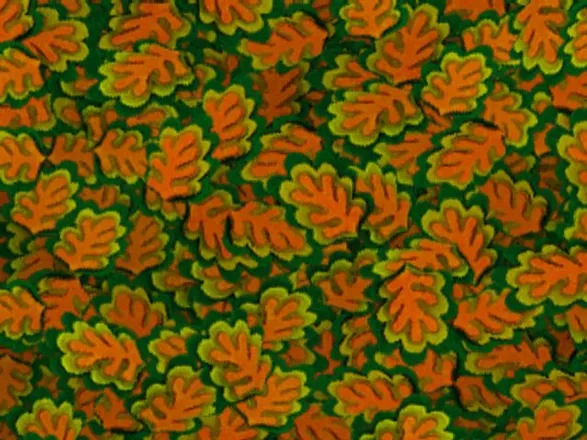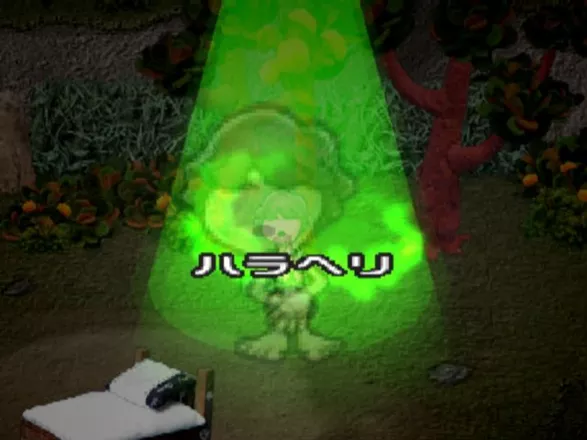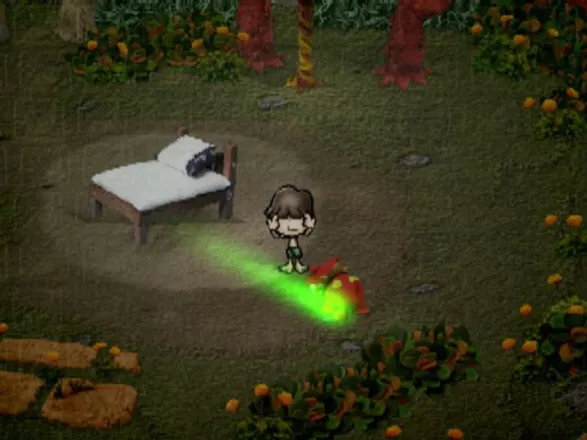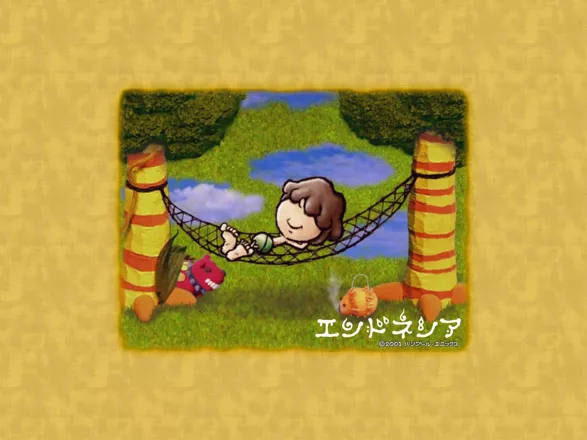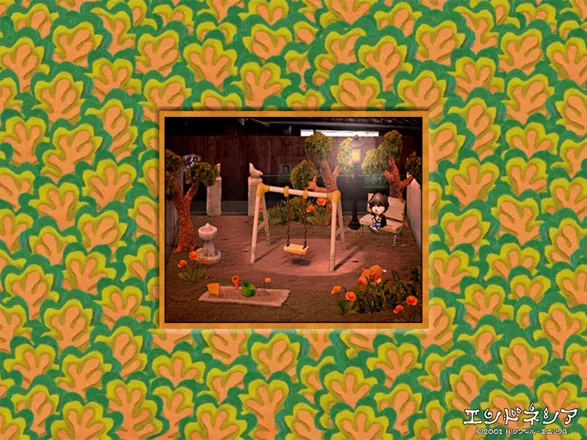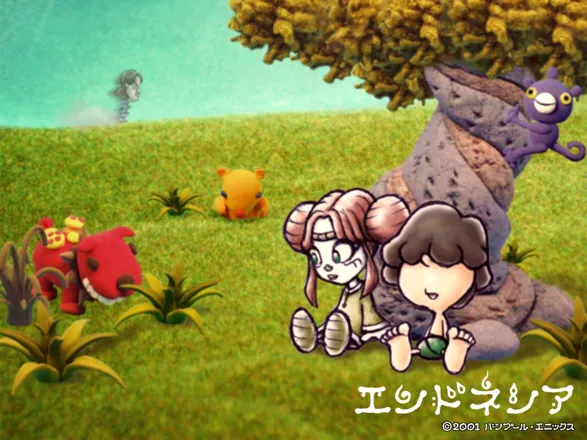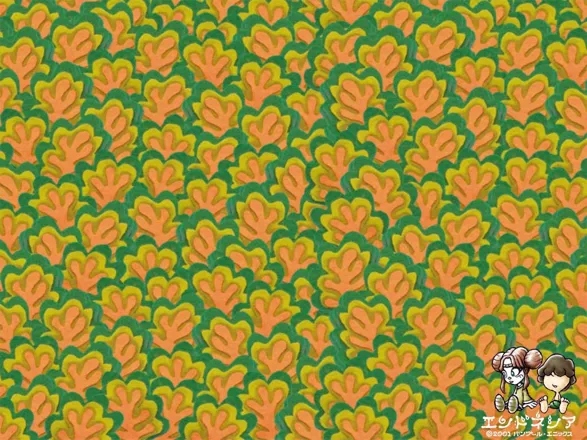Endonesia
Description
In Endonesia, the player takes the role of a boy who went into the park and suddenly found himself in another world. A mysterious voice contacts him and says that this world is called Endonesia, and if he wants to return home, he has to call upon its fifty gods. In order to find the gods, the hero has to communicate with the inhabitants of Endonesia by transferring his own emotions to others.
Created by Taro Kudo and Kazuyuki Kurashima of Love-de-lic fame, Endnesia is one of the spiritual descendants (along with Giftpia and Chulip) of their seminal game Moon: Remix RPG Adventure. Like those other games, Endnesia is a puzzle-solving adventure with RPG elements such as statistics, item-gathering, and character growth.
The theme of the game is sharing emotions; gameplay-wise, it translates into puzzle-solving which involves using the right emotion on the right characters at the right time. For example, using the Hunger emotion on an animal will make it hungry, urging it to find food, which will clear the path for the hero.
Similarly to Moon and its descendants, Endnesia has a day-night cycle. The hero's health meter is depleted due to exhaustion; though the game's world is quite large, the player always has a time limit for his daily activities. The player should also feed the hero; hunger makes his vision blurry and slows down his pace.
Spellings
- エンドネシア - Japanese spelling
Groups +
Screenshots
Promos
Credits (PlayStation 2 version)
85 People (81 developers, 4 thanks) · View all
| Planning | |
| Programming | |
| Graphics | |
| Sound | |
| Debug | |
| Graphics Support | |
| Management | |
| Producer | |
| Thanks |
|
| Debug | |
| [ full credits ] | |
Reviews
Players
Average score: 3.5 out of 5 (based on 2 ratings with 1 reviews)
How lethal insomnia can ruin a game
The Good
Endnesia was made by one of the three companies that split off Love-de-lic; each continued experimenting with the unique gameplay style discovered by Moon. Like their great progenitor, these games are essentially puzzle-solving adventures with light RPG elements; each of them has unorthodox premise and gameplay elements.
There is certainly a lot of creativity to witness in Endnesia. Though it owes much of its ideas and wacky visual design to Moon, the gameplay system puts some original ideas on the table. The main goal in the game is to "collect gods", i.e. perform actions that would awaken mythical entities slumbering inside clay sculptures. This is achieved by various puzzle-solving means, of which some are quite interesting: among those are the "emo powers" - emotions that the protagonist gradually experiences on his travels and is able to transmit to other creatures. For example, inflating a balloon makes the protagonist "happy". He gains the "happy" emo power, which can be later used on others to solve puzzles. Early in the game, you use this power on a fish, causing it to jump out of the water, getting eaten by a bird, who is then eaten by a crocodile; all this leads to the liberation of the "God of the Food Chain".
There is a fully functional internal clock in the game world, and most of its inhabitants have their own precise schedules. Observing these and seeing how things look differently at night or early in the morning is initially involving; unfortunately, this feature later becomes one of the many stumbling blocks on the way to enjoyment.
Graphical design in the game is very similar to that of Moon: strangely-looking people wander colorful 2D landscapes, conversing with each other in their own version of "gibberish language". The world itself, however, is quite original, with exotic, lush vegetation, natural phenomena, and unique fauna. The environments are vast and varied, with detailed, lovingly crafted, and often magically appealing locations. The world is undeniably the star of the game: if normal exploration of it were available, the game would have become a masterpiece.
The Bad
The designers of Endnesia created a beautiful world and then did everything in their power to prevent the players from enjoying it.
It is unfathomable how they could consciously, deliberately ruin the playing experience by adding superfluous, deeply irritating gameplay elements whose sole goal is to stand in the way of fun. The protagonist has a life meter that gradually depletes itself. No, you are not suffering from a disease that can be cured, you are not fighting enemies that can be defeated: you are just cursed with a life bar that leads to "Game Over" in less than an hour of real time. The only way to prevent that is to go all the way back to a location with a bed, and sleep.
To fully grasp the idiocy of this feature, one must understand that the game's world is indeed huge, and the tasks that need to be accomplished require meticulous exploration. There lies the contradiction that kills the game: there is a big, intriguing world out there, and you want to explore it, but you can't. All you have to think about is making it back to the bed in time. This usually involves back-tracking through several large areas; when your health is low, you even lose the ability to walk fast, which often leads to you dropping dead before you can reach the bed. To complement the sadistic feature, the bed is the only place where your game is saved - automatically, overwriting the only available slot, whether you agree with that or not.
The results are catastrophic. You are paralyzed beyond any reason, dedicating most of your time and thought to finding food (you have to feed the protagonist regularly, but you can never restore your health with food) and trying to stay alive simply because the designers thought that a slowly dying protagonist would be more fun to control. What could have been the backbone of the game - gradual, peaceful exploration - turns into an excruciating race against time, where nothing can grab your attention because you are afraid to wander off your bed and die.
The discrepancy becomes much worse when you realize that you must wander off to solve many of the game's puzzles. Here lies the second fatal flaw of Endnesia: puzzle design. The game has some of the most confusing, illogical, and poorly conceived puzzles I've ever seen. The overwhelming majority of the puzzles offer no clues whatsoever: you are supposed to solve them simply by using every emo power and trying every action available. You get no indication whatsoever concerning the gods you are supposed to be liberating; you learn about what they are only after you have already liberated them. This essentially means that you are forced to solve puzzles without even knowing what the puzzles are. Also, many of these tasks eschew the promising emo concept and instead rely on weird, nearly coincidental occasions, pixel-hunting, or annoying timing.
The latter is positively maddening: many puzzles can only be solved if you talk to the right person at the right time, then wait until the next day, do another action at the right time, etc. Missed something during the process? Tough luck, you'll have to wait at least a day or (more probably) a whole cycle of ten days (!) to try again. Combine this with the constant dying and you'll perhaps begin to imagine how agonizing the gameplay of Endnesia can get. It is basically one huge exercise in clueless trial-and-error without a sense of achievement or reward.
The Bottom Line
I wanted to like Endnesia. I kept coming back and giving more chances to its unique world and unusual gameplay. I wished to stay faithful to the great legacy of Moon. But when I realized I wasn't having any fun, I quit. No amount of original ideas and quirky art can make up for game mechanics that were designed to prevent players from entertaining themselves. I wish the creators of this game thought of this simple truth before releasing their interesting, but ultimately unenjoyable game.
PlayStation 2 · by Unicorn Lynx (181746) · 2017
Analytics
Upgrade to MobyPro to view research rankings!
Identifiers +
Contribute
Are you familiar with this game? Help document and preserve this entry in video game history! If your contribution is approved, you will earn points and be credited as a contributor.
Contributors to this Entry
Game added by Unicorn Lynx.
Game added December 23, 2010. Last modified January 19, 2024.
